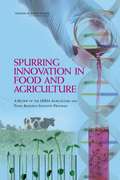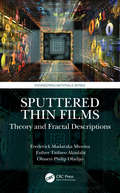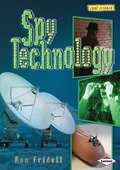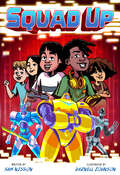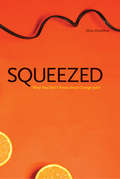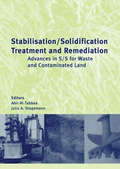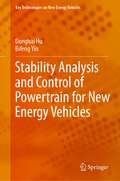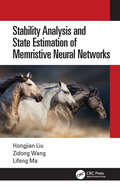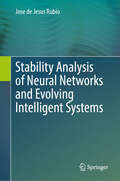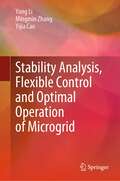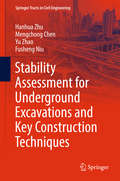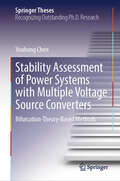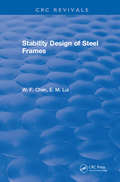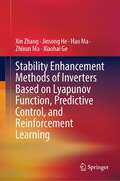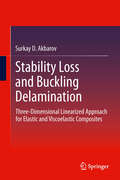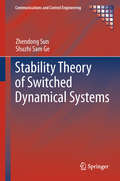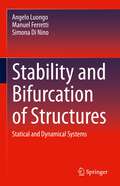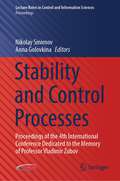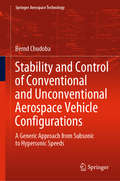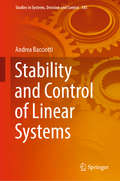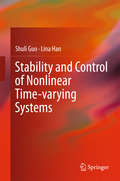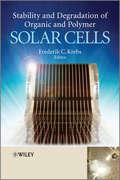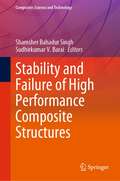- Table View
- List View
Spurring Innovation in Food and Agriculture: A Review of the USDA Agriculture and Food Research Initiative Program
by Committee on a Review of the USDA Agriculture Food Research InitiativeThe United States embarked on bold polices to enhance its food and agricultural system during the last half of the 19th century, investing first in the education of people and soon thereafter in research and discovery programs aimed at acquiring new knowledge needed to address the complex challenges of feeding a growing and hungry nation. Those policies, sustained over 125 years, have produced the most productive and efficient agricultural and food system in history. The U. S. Department of Agriculture (USDA) is the primary agency responsible for supporting innovations and advances in food and agriculture. USDA funds are allocated to support research through several mechanisms, including the Agriculture and Food Research Initiative (AFRI). In 2008, Congress replaced USDA's National Research Initiative with AFRI, creating USDA's flagship competitive research grants program, and the 2008 Food, Conservation, and Energy Act, known as the Farm Bill, outlined the structure of the new program. "Spurring Innovation in Food and Agriculture" assesses the effectiveness of AFRI in meeting the goals laid out by Congress and its success in advancing innovations and competitiveness in the U. S. food and agriculture system. "Spurring Innovation in Food and Agriculture" evaluates the value, relevance, quality, fairness, and flexibility of AFRI. This report also considers funding policies and mechanisms and identifies measures of the effectiveness and efficiency of AFRI's operation. The study examines AFRI's role in advancing science in relation to other research and grant programs inside of USDA as well as how complementary it is to other federal research and development programs. The findings and conclusions of this report will help AFRI improve its functions and effectiveness in meeting its goals and outcomes.
Sputtered Thin Films: Theory and Fractal Descriptions (Engineering Materials)
by Esther Titilayo Akinlabi Frederick Madaraka Mwema Oluseyi Philip OladijoSputtered Thin Films: Theory and Fractal Descriptions provides an overview of sputtered thin films and demystifies the concept of fractal theory in analysis of sputtered thin films. It simplifies the use of fractal tools in studying the growth and properties of thin films during sputtering processes. Part 1 of the book describes the basics and theory of thin film sputtering and fractals. Part 2 consists of examples illustrating specific descriptions of thin films using fractal methods. Discusses thin film growth, structure, and properties Covers fractal theory Presents methods of fractal measurements Offers typical examples of fractal descriptions of thin films grown via magnetron sputtering processes Describes application of fractal theory in prediction of thin film growth and properties This reference book is aimed at engineers and scientists working across a variety of disciplines including materials science and metallurgy as well as mechanical, manufacturing, electrical, and biomedical engineering.
Spy Technology (Cool Science Ser.)
by Ron FridellStealing secrets is a very old job. Spies from Europe set out to steal a precious secret from China about 1,500 years ago. At that time, the Chinese were making beautiful silk fabric. They created it from the cocoons of silkworms. No one else knew how to make it.
Spyder Web (Nolan Kilkenny #1)
by Tom GraceThey call it Spyder: a supposedly undetectable intelligence-gathering computer program that can easily penetrate heavily-encrypted computer networks. When ex-Navy SEAL Nolan Kilkenny discovers its existence, Spyder has already been stolen by three indusrial spies in a heist that quickly escalates to murder and treason. Suddenly, Kilkenny is leading the FBI and CIA in the search for Spyder... and is in the crosshairs of those who will stop at nothing to possess the ultimate spy weapon.
Squad Up (A Power Up Graphic Novel)
by Sam NissonSixth-graders Rhys and Miles overcome challenges in friendship and gaming in this graphic novel told in multiple art styles and set in both the real world and inside the boys' favorite video game. A sequel to Power Up.After their victory in the Every Game Ever tournament, unstoppable video game duo and, now, IRL best friends Rhys and Miles are enjoying their last few weeks of sixth grade. Miles's successful streaming channel gives him popularity points at school. Rhys's skill in Mecha Melee attracts the attention of elite gamers from around the world. And the duo is competing to be the first ever to beat Mecha Quest 21. If life were a video game, they have definitely levelled up.But when the challenges of gaming at this level are compounded by shifting priorities, a mysterious online bully, and the academic demands of middle school, the pressure on the duo threatens to break them apart. In this graphic novel about friendship and loyalty, Rhys and Miles discover that sometimes you need to tap your squad to get the win.
Squeezed: What You Don't Know about Orange Juice
by Alissa HamiltonClose to three quarters of U. S. households buy orange juice. Its popularity crosses class, cultural, racial, and regional divides. Why do so many of us drink orange juice? How did it turn from a luxury into a staple in just a few years? More important, how is it that we don't know the real reasons behind OJ's popularity or understand the processes by which the juice is produced? In this enlightening book, Alissa Hamilton explores the hidden history of orange juice. She looks at the early forces that propelled orange juice to prominence, including a surplus of oranges that plagued Florida during most of the twentieth century and the army's need to provide vitamin C to troops overseas during World War II. She tells the stories of the FDA's decision in the early 1960s to standardize orange juice, and the juice equivalent of the cola wars that followed between Coca-Cola (which owns Minute Maid) and Pepsi (which owns Tropicana). Of particular interest to OJ drinkers will be the revelation that most orange juice comes from Brazil, not Florida, and that even "not from concentrate" orange juice is heated, stripped of flavor, stored for up to a year, and then reflavored before it is packaged and sold. The book concludes with a thought-provoking discussion of why consumers have the right to know how their food is produced.
St. Louis: Bridges, Highways, and Roads (Images of America)
by Joe SondermanEvery street has a story. From the humblest cul-de-sac to the roaring interstates, the roads tell the stories and reveal the character that make each neighborhood unique. St. Louis was born of the great rivers, so its bridges played a crucial role. Together, the names of the roads tell the history of the child of the rivers that became the Gateway to the West. There are the stories behind the French street names pronounced in a uniquely St. Louis manner, the names purged from the map during World War I, and the histories behind the pioneers, politicians, developers, and everyday people who built St. Louis. Here are also the tragic tales of the epic struggle to bridge the great rivers. These photographs, many never published before, will show it all.
Stabilisation/Solidification Treatment and Remediation: Proceedings of the International Conference on Stabilisation/Solidification Treatment and Remediation, 12-13 April 2005, Cambridge, UK
by Abir Al-Tabbaa Julia A. StegemannStabilisation/Solidification Treatment and Remediation - Advances in S/S for Waste and Contaminated Land contains 39 papers, summaries of the four keynote lectures and the seven State of Practice reports presented at the International Conference organized by the EPSRC-funded network STARNET (Stabilisation/solidification treatment and remediation).
Stability Analysis and Control of Powertrain for New Energy Vehicles (Key Technologies on New Energy Vehicles)
by Donghai Hu Bifeng YinThis book introduces the application of nonlinear dynamics theory for driving system of electric vehicle and hybrid electric vehicle respectively. It establishes the dynamic models for driving system of electric vehicle and hybrid electric vehicle under various working conditions. And the nonlinear dynamics theory is applied to the qualitative analysis and quantitative calculation for the models. The theoretical analysis results are applied to guide the optimization of control strategies. In the end of each chapter, corresponding simulations or experiments are provided to verify the corresponding instances which are carefully selected. This book will give some guidance to readers when they deal with nonlinear dynamics problems of vehicles in the future and provide theoretical bases for the further study of the nonlinear dynamics for driving system of electric vehicle and hybrid electric vehicle.The book is written for engineer of electric vehicle and hybrid vehicle, teachers and students majoring in automobile and automation.
Stability Analysis and State Estimation of Memristive Neural Networks
by Zidong Wang Lifeng Ma Hongjian LiuIn this book, the stability analysis and estimator design problems are discussed for delayed discrete-time memristive neural networks. In each chapter, the analysis problems are firstly considered, where the stability, synchronization and other performances (e.g., robustness, disturbances attenuation level) are investigated within a unified theoretical framework. In this stage, some novel notions are put forward to reflect the engineering practice. Then, the estimator design issues are discussed where sufficient conditions are derived to ensure the existence of the desired estimators with guaranteed performances. Finally, the theories and techniques developed in previous parts are applied to deal with some issues in several emerging research areas. The book Unifies existing and emerging concepts concerning delayed discrete memristive neural networks with an emphasis on a variety of network-induced phenomena Captures recent advances of theories, techniques, and applications of delayed discrete memristive neural networks from a network-oriented perspective Provides a series of latest results in two popular yet interrelated areas, stability analysis and state estimation of neural networks Exploits a unified framework for analysis and synthesis by designing new tools and techniques in combination with conventional theories of systems science, control engineering and signal processing Gives simulation examples in each chapter to reflect the engineering practice
Stability Analysis of Neural Networks and Evolving Intelligent Systems
by Jose de RubioThis book explores the stability analysis of neural networks and evolving intelligent systems, focusing on their ability to adapt to changing environments. It differentiates between neural networks, which have a static structure and dynamic parameter learning, and evolving intelligent systems, where both structure and parameters are dynamic. A key concern addressed is ensuring the stability of these systems, as instability can lead to damage or accidents in online applications. Stability Analysis of Neural Networks and Evolving Intelligent Systems emphasizes that stable algorithms used in these systems must be compact, effective, and stable. The book is divided into two parts: the first five chapters cover stability analysis of neural networks, while the latter five chapters explore stability analysis of evolving intelligent systems. The Lyapunov method is the primary tool used for these analyses. Neural networks are applied to various modeling and prediction tasks, including warehouse load distribution, wind turbine behavior, crude oil blending, and beetle population dynamics. Evolving intelligent systems are applied to modeling brain and eye signals, nonlinear systems with dead-zone input, and the Box Jenkins furnace. Each chapter introduces specific techniques and algorithms, such as a backpropagation algorithm with a time-varying rate for neural networks, analytic neural network models for wind turbines, and self-organizing fuzzy modified least square networks (SOFMLS) for evolving systems. The book also addresses challenges like incomplete data and big data learning, proposing hybrid methods and modified algorithms to improve performance and stability. The effectiveness of the proposed techniques is verified through simulations and comparisons with existing methods.
Stability Analysis, Flexible Control and Optimal Operation of Microgrid
by Yijia Cao Yong Li Mingmin ZhangThis book intends to report the new results of the microgrid in stability analysis, flexible control and optimal operation. The oscillatory stability issue of DC microgrid is explored and further solved. Flexible and stable voltage & frequency control of microgrid is put forward considering the distributed generations or distributed energy storages. The optimal operation of multi-energy is researched in view of economic efficiency and low-carbon development. The results of this book are original from authors who carry out the related research together for a long time, which is a comprehensive summary for authors’ latest research results. The book is likely to be of interest to university researchers, electrical engineers and graduate students in power systems, power electronics, renewable energy and microgrid.
Stability Assessment for Underground Excavations and Key Construction Techniques
by Hanhua Zhu Mengchong Chen Yu Zhao Fusheng NiuThis book examines how the state of underground structures can be determined with the assistance of force, deformation and energy. It then analyzes mechanized shield methods, the New Austrian tunneling method (NATM) and conventional methods from this new perspective. The book gathers a wealth of cases reflecting the experiences of practitioners and administrators alike. Based on statistical and engineering studies of these cases, as well as lab and field experiments, it develops a stability assessment approach incorporating a stable equilibrium, which enables engineers to keep the structure and surrounding rocks safe as long as the stable equilibrium and deformation compliance are maintained. The book illustrates the implementation of the method in various tunneling contexts, including soil-rock mixed strata, tunneling beneath operating roads, underwater tunnels, and tunnel pit excavation. It offers a valuable guide for researchers, designers and engineers, especially those who are seeking to understand the underlying principles of underground excavation.
Stability Assessment of Power Systems with Multiple Voltage Source Converters: Bifurcation-Theory-Based Methods (Springer Theses)
by Youhong ChenThis book offers a comprehensive assessment of the stability of modern power systems through advanced nonlinear analysis frameworks. It addresses the new challenges to power system stability posed by the anticipated integration of numerous power-electronic-interfaced devices needed to support renewable energy generation. Given the diverse operational timescales associated with controllers for power-electronic-interfaced devices, these devices can have an impact on a wide range of dynamic phenomena, thereby significantly influencing the system's dynamic performance and stability. The methodologies presented effectively manage the significant changes in system dynamics introduced by these devices. This research utilizes nonlinear methodologies, specifically bifurcation theory, to analyse various stability types in such power-electronic-rich systems. The book adopts a bifurcation-based methodology to evaluate power system stability through detailed examination of each type of instability mechanism. The methodology developed is extended to explore the interactions between multiple types of system stability considering the impacts of different voltage-source-converter controllers and grid strengths. Finally, to reduce the high computational burden imposed by the proposed methodology, a hybrid network model is developed to assess the system stability efficiently. Stability Assessment of Power Systems with Multiple Voltage Source Converters is of interest to students, researchers, and industry professionals in the field of electrical engineering.
Stability Design of Steel Frames (New Directions In Civil Engineering Ser.)
by Wai-Kai ChenStability Design of Steel Frames provides a summary of the behavior, analysis and design of structural steel members and frames with flexibly-jointed connections. The book presents the theory and design of structural stability and includes extensions of computer-based analyses for individual members in space with imperfections. It also shows how connection flexibility influences the behavior and design of steel frames and how designers must consider this in a limit-state analysis and design procedure. The clearly written text and extensive bibliography make this a practical book for advanced students, researchers and professionals in civil and structural engineering, as well as a useful supplement to traditional books on the theory and design of structural stability.
Stability Enhancement Methods of Inverters Based on Lyapunov Function, Predictive Control, and Reinforcement Learning
by Xin Zhang Hao Ma Jinsong He Zhixun Ma Xiaohai GeThis book introduces a family of large-signal stability-based control methods for different power inverters (grid-connected inverter, standalone inverter, single-phase inverter, and three-phase inverter) in practical applications. Power inverters have stability issues, which include the inverter's own instability as well as the inverter's instability in relation to the other power electronic devices in the system (i.e., weak grid and the EMI filter). Most of the stability analyses and solutions are based on small-signal stability technology. Unfortunately, in actuality, the majority of practical instability concerns in power inverter systems are large-signal stability problems, which, when compared to small-signal stability problems, can cause substantial damage to electrical equipment. As a result, researchers must conduct a comprehensive investigation of the large-signal stability challenge and solutions for power inverters. This book can be used as a reference for researchers, power inverters manufacturers, and end-users. As a result, the book will not become obsolete in the near future, regardless of technology advancements.
Stability Loss and Buckling Delamination
by Surkay AkbarovThis book investigates stability loss problems of the viscoelastic composite materials and structural members within the framework of the Three-Dimensional Linearized Theory of Stability (TDLTS). The stability loss problems are considered the development of the initial infinitesimal imperfection in the structure of the material or of the structural members. This development is studied within the framework of the Three-Dimensional Geometrical Non-Linear Theory of the Deformable Solid Body Mechanics. The solution to the corresponding boundary-value problems is presented in the series form in the small parameter which characterizes the degree of the initial imperfection. In this way, the nonlinear problems for the domains bounded by noncanonical surfaces are reduced for the same nonlinear problem for the corresponding domains bounded by canonical surfaces and the series subsequent linearized problems. It is proven that the equations and relations of these linearized problems coincide with the corresponding ones of the well-known TDLTS. Under concrete investigations as stability loss criterion the case is taken for the initial infinitesimal imperfection that starts to increase indefinitely. Moreover, it is proven that the critical parameters can be determined by the use of only the zeroth and first approximations.
Stability Theory of Switched Dynamical Systems
by Zhendong Sun Shuzhi Sam GeThere are plenty of challenging and interesting problems open for investigation in the field of switched systems. Stability issues help to generate many complex nonlinear dynamic behaviors within switched systems. The authors present a thorough investigation of stability effects on three broad classes of switching mechanism: arbitrary switching where stability represents robustness to unpredictable and undesirable perturbation, constrained switching, including random (within a known stochastic distribution), dwell-time (with a known minimum duration for each subsystem) and autonomously-generated (with a pre-assigned mechanism) switching; and designed switching in which a measurable and freely-assigned switching mechanism contributes to stability by acting as a control input. For each of these classes this book propounds: detailed stability analysis and/or design, related robustness and performance issues, connections to other control problems and many motivating and illustrative examples.
Stability and Bifurcation of Structures: Statical and Dynamical Systems
by Angelo Luongo Manuel Ferretti Simona Di NinoThis book overcomes the separation existing in literature between the static and the dynamic bifurcation worlds. It brings together buckling and post-buckling problems with nonlinear dynamics, the bridge being represented by the perturbation method, i.e., a mathematical tool that allows for solving static and dynamic problems virtually in the same way. The book is organized as follows: Chapter one gives an overview; Chapter two illustrates phenomenological aspect of static and dynamic bifurcations; Chapter three deals with linear stability analysis of dynamical systems; Chapter four and five discuss the general theory and present examples of buckling and post-buckling of elastic structures; Chapter six describes a linearized approach to buckling, usually adopted in the technical literature, in which pre-critical deformations are neglected; Chapters seven to ten, analyze elastic and elasto-plastic buckling of planar systems of beams, thin-walled beams and plate assemblies, respectively; Chapters eleven to thirteen, illustrate dynamic instability phenomena, such as flutter induced by follower forces, aeroelastic bifurcations caused by wind flow, and parametric excitation triggered by pulsating loads. Finally, Chapter fourteen discusses a large gallery of solved problems, concerning topics covered in the book. An Appendix presents the Vlasov theory of open thin-walled beams. The book is devoted to advanced undergraduate and graduate students, as well as engineers and practitioners. The methods illustrated here are immediately applicable to model real problems.The BookIntroduces, in a simple way, complex concepts of bifurcation theory, by making use of elementary mathematicsGives a comprehensive overview of bifurcation of linear and nonlinear structures, in static and dynamic fieldsContains a chapter in which many problems are solved, either analytically or numerically, and results commented
Stability and Control Processes: Proceedings of the 4th International Conference Dedicated to the Memory of Professor Vladimir Zubov (Lecture Notes in Control and Information Sciences - Proceedings)
by Nikolay Smirnov Anna GolovkinaThe proceedings of the 4th Stability and Control Processes Conference are focused on modern applied mathematics, stability theory, and control processes. The conference was held in recognition of the 90th birthday of Professor Vladimir Ivanovich Zubov (1930–2000).This selection of papers reflects the wide-ranging nature of V. I. Zubov’s work, which included contributions to the development of the qualitative theory of differential equations, the theory of rigid body motion, optimal control theory, and the theory of electromagnetic fields. It helps to advance many aspects of the theory of control systems, including questions of motion stability, nonlinear oscillations in control systems, navigation and reliability of control devices, vibration theory, and quantization of orbits. The disparate applications covered by the book – in mechanical systems, game theory, solid-state physics, socio-economic systems and medical and biological systems, control automata and navigation – are developments from Professor Zubov’s in-depth studies on the theory of stability of motion, the theory of automatic control and the theory of the motions of optimal processes. Stability and Control Processes presents research continuing the legacy of V. I. Zubov and updates it with sections focused on intelligence-based control. These proceedings will be of interest to academics, professionals working in industry and researchers alike.
Stability and Control of Conventional and Unconventional Aerospace Vehicle Configurations: A Generic Approach from Subsonic to Hypersonic Speeds (Springer Aerospace Technology)
by Bernd ChudobaThis book introduces a stability and control methodology named AeroMech, capable of sizing the primary control effectors of fixed wing subsonic to hypersonic designs of conventional and unconventional configuration layout. Control power demands are harmonized with static-, dynamic-, and maneuver stability requirements, while taking the six-degree-of-freedom trim state into account. The stability and control analysis solves the static- and dynamic equations of motion combined with non-linear vortex lattice aerodynamics for analysis. The true complexity of addressing subsonic to hypersonic vehicle stability and control during the conceptual design phase is hidden in the objective to develop a generic (vehicle configuration independent) methodology concept. The inclusion of geometrically asymmetric aircraft layouts, in addition to the reasonably well-known symmetric aircraft types, contributes significantly to the overall technical complexity and level of abstraction. The first three chapters describe the preparatory work invested along with the research strategy devised, thereby placing strong emphasis on systematic and thorough knowledge utilization. The engineering-scientific method itself is derived throughout the second half of the book. This book offers a unique aerospace vehicle configuration independent (generic) methodology and mathematical algorithm. The approach satisfies the initial technical quest: How to develop a ‘configuration stability & control’ methodology module for an advanced multi-disciplinary aerospace vehicle design synthesis environment that permits consistent aerospace vehicle design evaluations?
Stability and Control of Linear Systems (Studies in Systems, Decision and Control #185)
by Andrea BacciottiThis advanced textbook introduces the main concepts and advances in systems and control theory, and highlights the importance of geometric ideas in the context of possible extensions to the more recent developments in nonlinear systems theory. Although inspired by engineering applications, the content is presented within a strong theoretical framework and with a solid mathematical background, and the reference models are always finite dimensional, time-invariant multivariable linear systems. The book focuses on the time domain approach, but also considers the frequency domain approach, discussing the relationship between the two approaches, especially for single-input-single-output systems. It includes topics not usually addressed in similar books, such as a comparison between the frequency domain and the time domain approaches, bounded input bounded output stability (including a characterization in terms of canonical decomposition), and static output feedback stabilization for which a simple and original criterion in terms of generalized inverse matrices is proposed. The book is an ideal learning resource for graduate students of control theory and automatic control courses in engineering and mathematics, as well as a reference or self-study guide for engineers and applied mathematicians.
Stability and Control of Nonlinear Time-varying Systems
by Shuli Guo Lina HanThis book presents special systems derived from industrial models, including the complex saturation nonlinear functions and the delay nonlinear functions. It also presents typical methods, such as the classical Liapunov and Integral Inequalities methods. Providing constructive qualitative and stability conditions for linear systems with saturated inputs in both global and local contexts, it offers practitioners more concise model systems for modern saturation nonlinear techniques, which have the potential for future applications. This book is a valuable guide for researchers and graduate students in the fields of mathematics, control, and engineering.
Stability and Degradation of Organic and Polymer Solar Cells
by Frederik C. KrebsOrganic photovoltaics (OPV) are a new generation of solar cells with the potential to offer very short energy pay back times, mechanical flexibility and significantly lower production costs compared to traditional crystalline photovoltaic systems. A weakness of OPV is their comparative instability during operation and this is a critical area of research towards the successful development and commercialization of these 3rd generation solar cells.Covering both small molecule and polymer solar cells, Stability and Degradation of Organic and Polymer Solar Cells summarizes the state of the art understanding of stability and provides a detailed analysis of the mechanisms by which degradation occurs. Following an introductory chapter which compares different photovoltaic technologies, the book focuses on OPV degradation, discussing the origin and characterization of the instability and describing measures for extending the duration of operation.Topics covered include:Chemical and physical probes for studying degradation Imaging techniques Photochemical stability of OPV materials Degradation mechanisms Testing methods Barrier technology and applications Stability and Degradation of Organic and Polymer Solar Cells is an essential reference source for researchers in academia and industry, engineers and manufacturers working on OPV design, development and implementation.
Stability and Failure of High Performance Composite Structures (Composites Science and Technology)
by Sudhirkumar V. Barai Shamsher Bahadur SinghThis book is written to introduce the application of high-performance composite materials such as fiber reinforced polymers, functionally graded composites, and sustainable fiber reinforced composites for development of thin-walled plated structures, beams, girders, and deck structures subjected to different kinds of loads. This book also includes test cases and its validation with finite element method using general purpose commercial computer software. Moreover, the book also deals with design methodology of advanced composite materials based on different applications. The comprehensive overview of the state-of-the-art research on the high-performance composite structures dealing with their stability, response, and failure characteristics will be of significant interest to scientists, researchers, students, and engineers working in the thrust area of advanced composite structures. This book is also helpful for Ph.D. candidates for developing their fundamental understanding on high-performance composite structures, and it will also appropriate for master- and undergraduate-level courses on design of composite structures especially for Civil Engineering Infrastructures.
